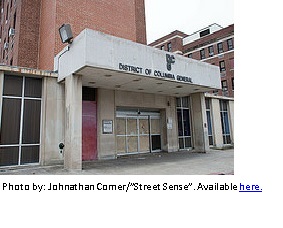As the District works to finalize plans for replacing the dilapidated DC General homeless shelter with a series of smaller shelters, DCFPI feels it is reasonable for the new shelters to have single rooms for each family, rather than a full apartment as called for under current law. Using smaller spaces per family will help limit the number of replacement sites and costs. But those rooms should have their own bathroom and minimal cooking options, such as a microwave and small refrigerator, to meet basic safety and privacy needs of homeless families.
Mayor Bowser, who led the charge to replace DC General and provided funding to do so, has sought to have the new shelters offer a single room for each family, rather than a full apartment. Private rooms take up less space than apartments, allowing the District to shelter more families at each site.
DCFPI has indicated that we believe this could work if safety issues are addressed and if the District maintains enough apartment-style units in other shelters for families with special needs. Shared bathrooms pose safety concerns, given that many homeless families have experienced trauma. Additionally, some families have disabilities that require a private bathroom or cooking facilities to prepare special diets.
There is broad agreement that the new shelters should have a substantial number of private bathrooms. A special committee created by Mayor Bowser — the Committee on Design Guidelines for Emergency Housing for Families Experiencing Homelessness concluded that the “overwhelming recommendation was to maximize private bathroom space however possible without delaying closing DC General.” Recent surveys of homeless families suggest that most, but not all, feel a private bathroom is very important for their family.
It appears that the best way to balance families’ needs while limiting the space requirements for each shelter may be to provide a small private bathroom for each family. The District could design new shelters with most units having a private bathroom, as well as some communal bathrooms. But this could actually require more space than providing small private bathrooms for each room, since communal bathrooms tend to be large. Given that, DCFPI recommends that the legislation needed to move the shelter replacement plan forward should call for private bathrooms for each room, along with a microwave oven and small refrigerator.
This may add to the costs of replacing DC General, and may require more replacement sites than currently planned. But if that is what is needed to provide shelters that meet the safety and privacy needs of families, the District should find the resources to do so. It is not uncommon for the costs of major construction projects to rise as the plans move forward. The cost of modernizing the Duke Ellington School for the Performing Arts has risen dramatically, including a recent requested addition of $10 million by Mayor Bowser. Moreover, Mayor Bowser recently proposed $60 million in reprogrammed funds, much of it to capital projects (including the funds for Duke Ellington), a sign that the city can find resources when needed to adequately fund capital projects.
Even if new funds are needed to replace DC General, the District already has set aside a substantial amount of funding for this purpose and should be able to start moving ahead to acquire at least some of the sites needed.
Kate Coventry is a DCFPI Policy Analyst and voting member of the Interagency Council on Homelessness.
To print a copy of today’s blog, click here.
